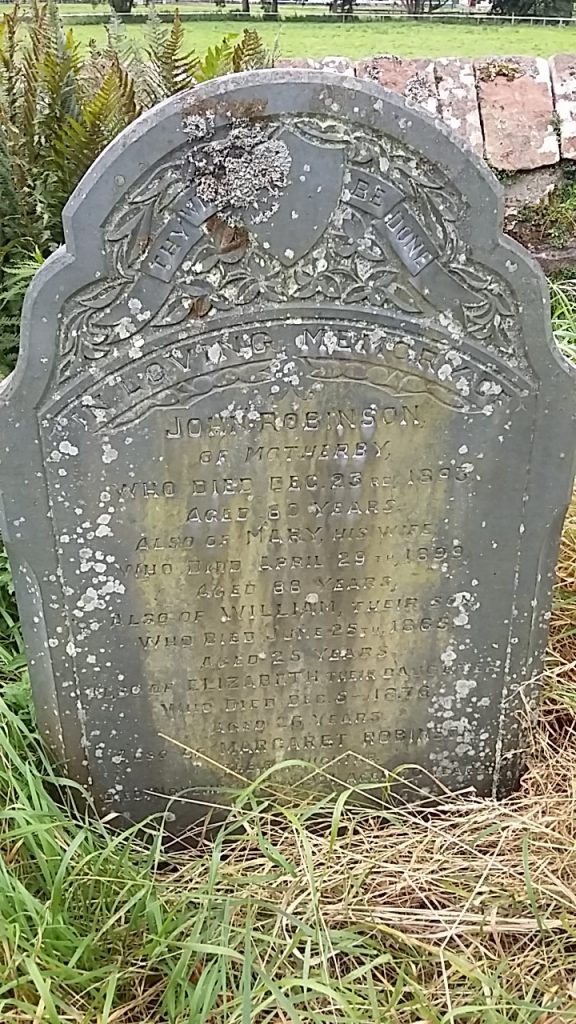The first Corn Law was enacted in 1815. One of its consequences was its detrimental effect on the poor who were already subject to the vagaries of the weather and variable harvests.[1]
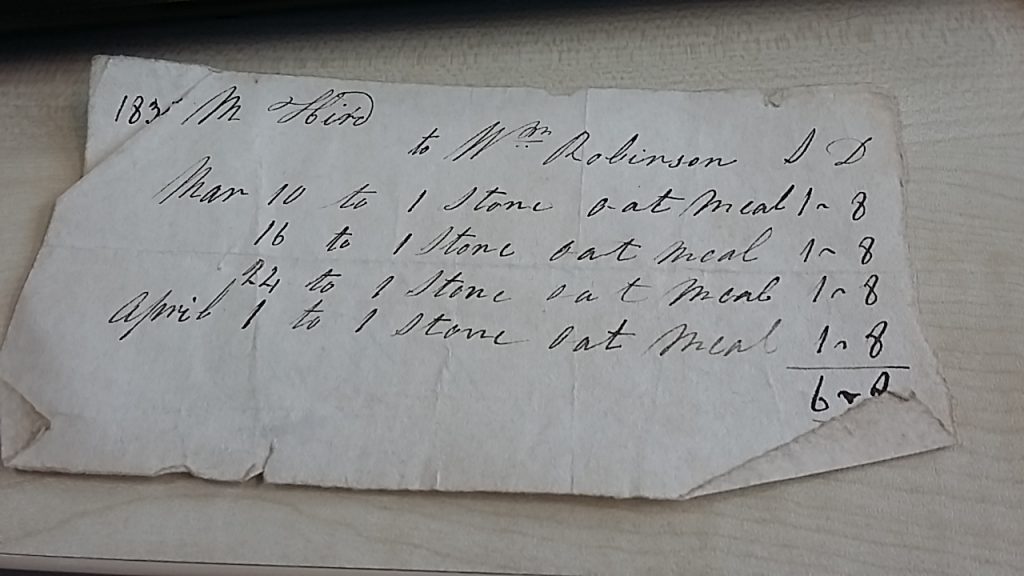
Two Vouchers exists from the parish of Greystoke for William Robinson, a miller. One for the supply of oat meal in 1835 [2], the other a bill settled 3 April 1827. [ 3] The later is from William Hodgson, a farmer at Blencow and also overseer, for the supply of flour to the poor in November 1826. It is assumed from looking at the trade directories that this was from Robinson’s time at Hutton Mill. [4]
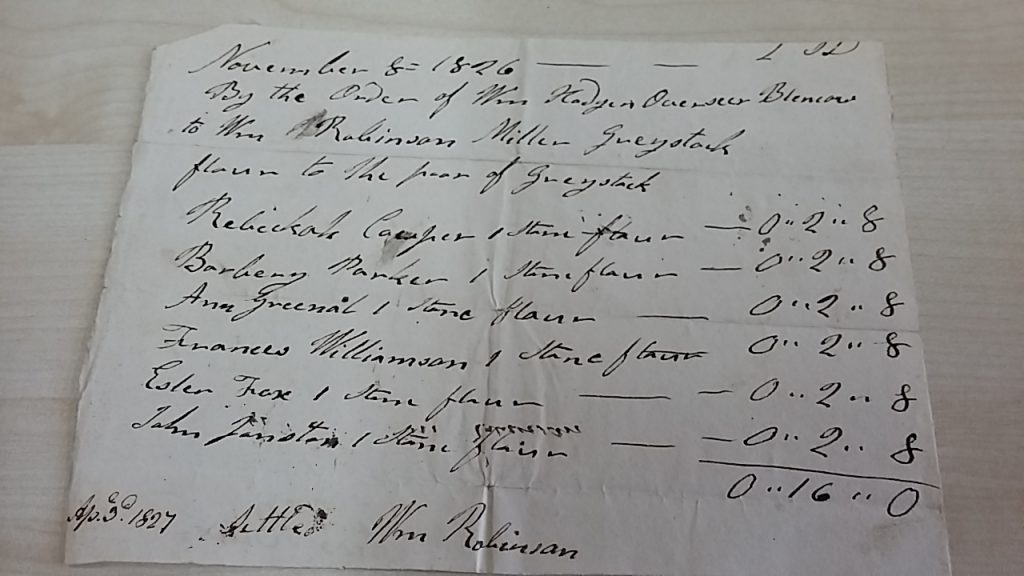
An undated list of people choosing to use Sparket and Greystoke Mill instead of Hutton Mill to grind their corn exists when Hutton Mill was described as in good repair.[5] Looking at the names on the list, it possibly dates from around the late-eighteenth century. Although the nature of its significance is not known it may be related to the ‘Lord of the Manor’ stipulating where the inhabitants took their corn. It is thought William leased the Corn Mill when Henry Howard of Greystoke Castle was the landowner.[6]
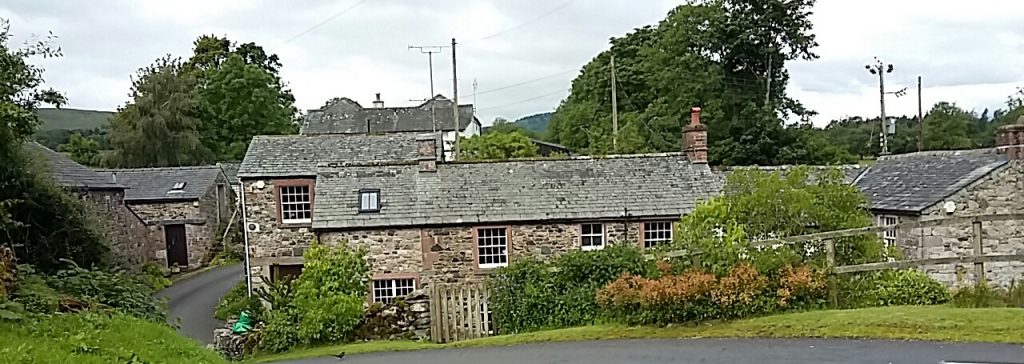
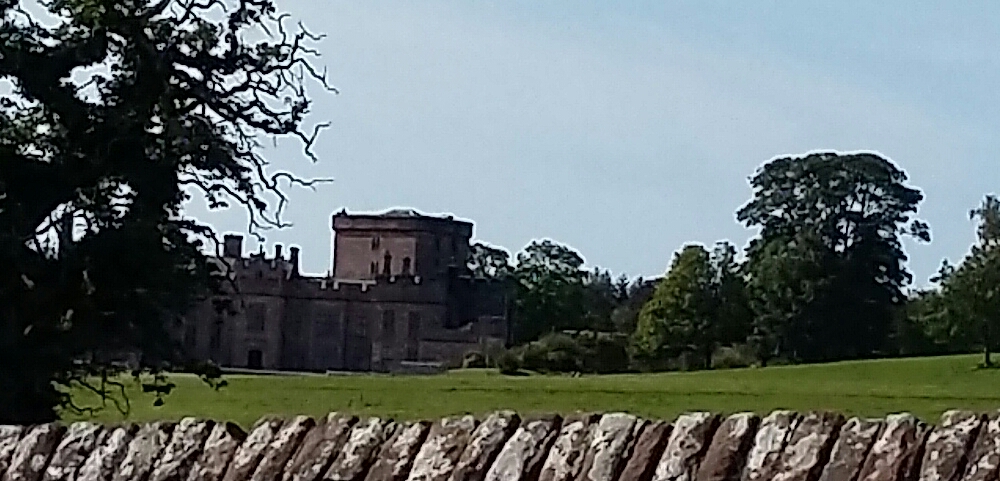
Those named on the bill of 1826 are Rebeckah [sic] Cowper, Barbery [sic] Parker, Ann Greenal, Frances Williamson, Esther Fox and John Johnston. The order is for a stone of flour [type unknown] supplied at a cost of 2s 8d each. It is not known if this was something done on a regular basis by Robinson.
Some of the recipients of the flour appear to have had other help from the community by means of the poor law. Rebeckah Cowper had received relief in the past. Her name being in the Overseers Account book between 1810-1814. [7] She died in 1847 aged 87. Esther Ward had married John Fox in 1815 and was widowed with a young son Ralph. She died in Penrith in 1861 aged 77 years, having worked as a charlady and general servant. Ann Greenal’s name appears on a bill for Dr W. J. Irving in 1827 for attendance in labour and subsequent medical care. By the time of the 1851 census she was a laundress/pauper living with her son, William. She died in 1864 aged 77. Barbara Parker had sought help from the parish when expecting a child in 1820. A warrant was issued for a Richard Gillespie on 27 October 1820 for him to being examined concerning her yet-to-be- born bastard child. [8]
By contrast William Robinson’s business prospered through the nineteenth century. He could be described as being part of the Robinson dynasty of millers/corn factors.
William was baptised at Crosby Ravensworth 16 November 1783. His parents John Robinson (1749-1833) and Mary Clark (1751-1836) ran a mill at Maulds Meaburn. His other brothers took on mills in Cumberland and Westmorland. Thomas (1775-1851) at Craigs Mill, Shap; John (1778-1848) Bongate Mill Appleby; Joseph (1781-1864) Askham Mill, Westmorland; Robert (1785-1874) Maulds Meaburn mill; and Mathew (1787-1853) Sockbridge mill, near Penrith. Their only sister Mary (b.1776) married John Laycock, also a miller.[9]
William Robinson had served an apprenticeship at Millhouse near Hesket Newmarket with his cousin Robert Clark before going to Greystoke Mill where his future wife’s parents Thomas Routledge and Eleanor Smith were the millers. On 13 June 1810 he married their widowed daughter Mary, who already had two young children, Elizabeth and Isaac. They had a further five children: John, baptised 23 March 1813, and William baptised 23 April 1817, who along with Mary’s son Isaac Routledge (1807-1877) were all involved in the milling business. Thomas (1815-1897) broke the mould and became a cleric . Daughter Mary (1810-1891) married John Todhunter a blacksmith but was widowed a year later. Youngest daughter Eleanor or Ellen (1819-1881) married Isaac Kidd, a farmer, later in life. Both daughters lived in the Greystoke area. [10]
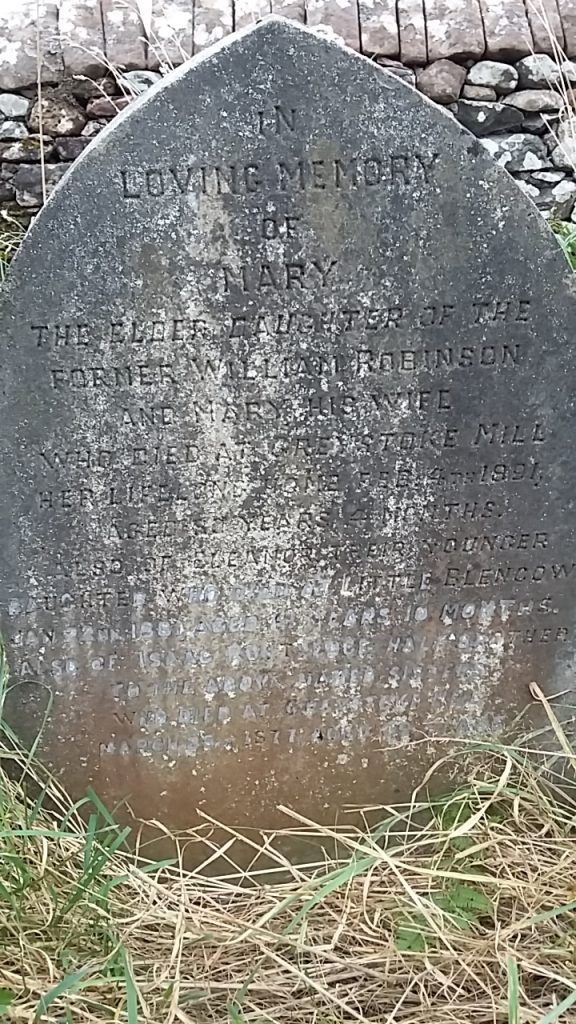
William Robinson returned to Greystoke Mill, where he died on 26 January 1857, aged 75. His wife predeceased him. Memorials to William and Mary Robinson, as well as some of their children, are located at St Andrew’s Church, Greystoke.
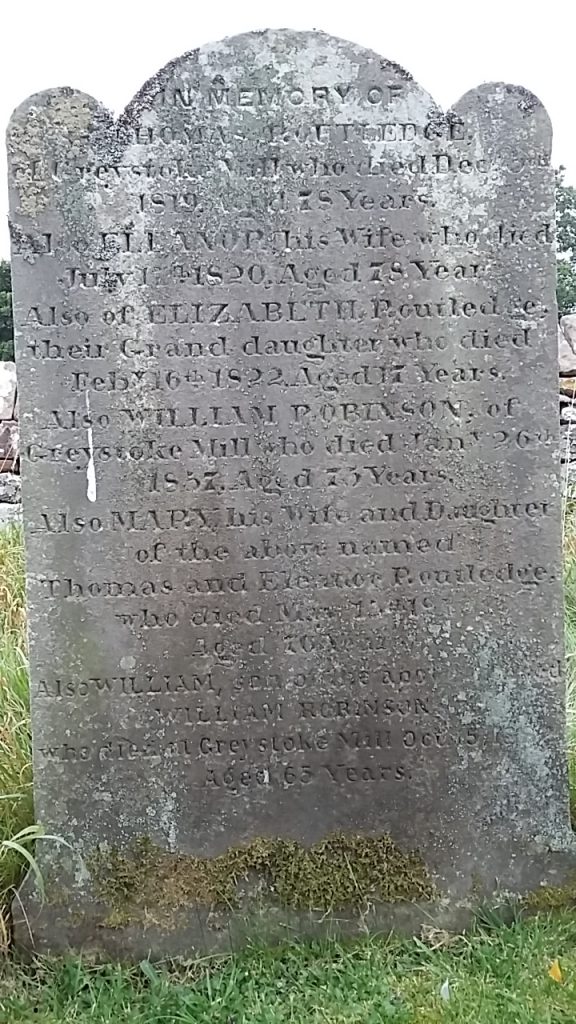
Sources
[1] www.thepoorlaw.org Ann White, East Sussex, The price of bread, 31 July 2019
[2] Cumbria Archives, Hutton Soil, Overseers’ voucher, SPC/26/12 5, 10 March – 1 April 1835
[3] Cumbria Archives, Greystoke Overseers’ voucher, PR5/67-F item 5, William Robinson’s bill settled 3 April 1827
[4] Parson and White, Principal Inhabitants of Cumberland and Westmorland (1829), Compiled by Roland Gregg; Pigot, Directory of Cumberland and Westmorland ( Pigot and Co., 1834); William Robinson, Greystoke and Hutton Mill, www.ancestry.co.uk [accessed 20 September 2020]
[5] Cumbria Archives, DHUD/8/56/20, List of Tenants of Whitbarrow, Penruddock and Hutton Soil not grinding corn last winter at Hutton Mill, who went to Sparket Mill and Greystoke mill instead. undated.
[6] Carlisle Patriot, 14 August 1841, p.1, col. d, Freehold Property in the Parish of Greystoke
[7] Cumbria Archives, PR5/45, Greystoke Overseers’ Account book, 1810-1814
[8] Cumbria Archives PR5/67A iem 1, Greystoke Overseers’ Voucher, April 12 1827, W. J. Irving; PR5/67A item 3, 27 October 1820 and PR5/67A item 4, 27 February 1821 [Richard Gillespie] [accessed 20 September 2020]
[9] Penrith Observer, 24 May 1949, p. 7, col. b-c. Robinson’s were Millers for 200 years.
[10] Cumbria Libraries, (920 ROB), Margaret Clark, The Black Book of the Richardson Trust, A question of Inheritance. The letter book of William Robinson, Miller of Greystoke from 1854-55, 3rd edn. (2008).
